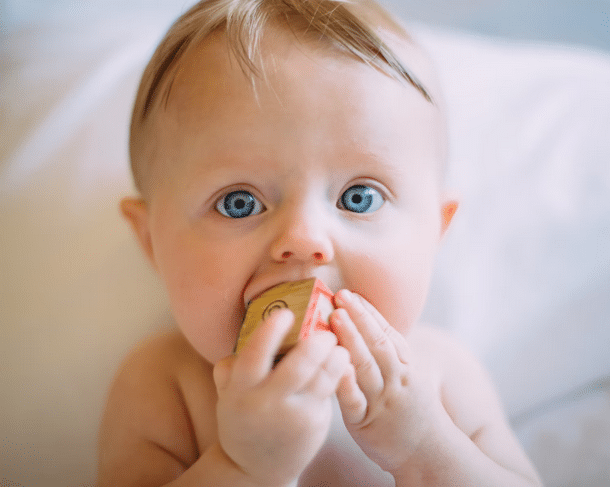We all love babies. They coo and giggle, and their smiles are heartwarming. However, one thing can quickly make a smile vanish and leave your baby irritable — teething pain.
When babies get their first tooth, it’s usually a painful experience and equally stressful for the parents. However, with proper knowledge and the right approach, you can help your baby have a better teething experience.
This guide will show you what to expect during teething, when your baby is likely to start, how to recognise teething symptoms, and ways to make the process less painful.
When Do Babies Start Teething?
Every baby is unique, and there’s no exact time for their first tooth to come through. The timing will vary from child to child.
According to the Australian Dental Association (ADA), you can expect babies to get their earliest tooth when they’re about six to eight months old. Sometimes, a child’s first tooth may not appear until much later. However, according to Health Direct, there’s no need to worry about timing.
When baby teething begins, the two bottom front ones are usually the first to come through the gums. A dentist would refer to these as lower central incisors, one on each side of the mouth. The two upper front teeth (upper central incisors) are then followed by the second front teeth (lateral incisors) will start to appear over the next 12 months. The molars and canines are next in the months that follow. Typically, a complete set of “baby teeth” will have formed by the time a child is two or three.
What Are Symptoms and Signs to Observe When a Baby Is Teething?
Just as the timing varies, so do the responses babies have to teething. Some infants feel little or no pain during teething, while others may become unsettled because of aches and irritation. Signs and symptoms of teething can be hard to pick at first and may vary from child to child and tooth to tooth. Notable mentions include:
- Irritability.
- Disturbed sleep.
- Excessive drool that can result in rashes around the mouth.
- Biting, chewing, and gnawing on things like toys or blankets.
While baby teething can often be a painful process for infants, it’s crucial to note that it doesn’t result in sickness. However, if your baby is experiencing a high fever, diarrhea, is unwell, or has an unrelated rash during teething please seek medical advice from your GP or pediatrician immediately.
What You Can Do to Help Your Teething Baby
As a parent, there are some steps you can take to help ease your little one’s discomfort as their baby teeth emerge. Besides brushing your infant’s teeth or wiping their gums to keep them clean, here are other things you can try:
- Provide physical support with lots of cuddles if needed. Lots of play can also help distract them.
- Give your baby something cold to help reduce the pain or irritation in the gums. Cooled teething rings, cold treats like applesauce, and cool ice-free water (for babies around six months) can offer solace.
- Give your baby something to bite/chew on. While a rubber teething ring works well, select one without liquid. This step can satisfy their urge to chew on something.
- Dip a clean finger in cool water and stroke your baby’s gums for a few minutes. This may also help reduce gum pain.
- You could also offer pain relief medication. Contact your GP or pediatrician about what amounts to a safe dose for your child’s age.
The Australian Dental Association has provided a free and easy-to-follow guide that can further help you soothe your teething baby.
Things to Avoid When Caring for Baby Teeth
The following are steps you should never take when taking care of your baby’s teeth and gums:
- Don’t apply teething gels without seeking advice from your doctor, dentist, or pharmacist first. Always follow the instructions carefully to prevent overdose or harmful side effects.
- Don’t dip teething rings or dummies in honey or jams as it increases the risk of tooth decay and doesn’t help with pain relief.
- Don’t use Amber teething necklaces — they pose a choking risk and can strangle the baby.
When to Call the Doctor About Teething
Teething problems sometimes produce symptoms similar to those of a cold or flu. Consult a doctor if the symptoms appear differently, or discomfort persists. If your little one displays signs of an infection or other symptoms not related to teething, it is time to contact your doctor. It’s also good dental health practice to schedule a dentist appointment when the baby turns one to check all their new teeth.
Summary
Children are not the same and each will go through teething differently. Some teething symptoms will present consistently when that child has a new tooth come through while others may vary with each new tooth. If your child starts to get their new teeth and shows symptoms of teething issues, remember to apply best practices while being gentle, loving, and patient.
While there’s no set deadline for your baby’s first teeth to come in, they usually begin to come through around 6 months. Be aware and prepared for possible teething symptoms around this age. If in doubt, reach out to your GP or child-friendly dentist for advice.
Prepare for your child’s next dental appointment early by contacting us and making a booking today.

